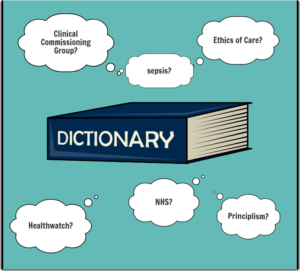Glossary

This glossary includes both terms used on the AdsFoundation website and wider legal and ethical terms that you might like explained. Words are listed alphabetically.
Autonomy is in essence about the integrity and dignity of an individual human and the individual’s right to decide what is done or not done to his or her body, for example, make decisions about his or her medical treatment.
Clinical Commissioning Groups (CCG) are found across England. They were established by the Health and Social Care Act 2021 to manage the NHS commissioning budget in England. They plan and commission hospital, community and mental health services within their area. All GP practices must have a member on their local CCG. Every CCG board must also have at least one hospital doctor, one nurse and member of the public.
Community Interest Company in England and Wales is a limited company set up to benefit the community rather than private shareholders.
Consequential ethics is the theory that the rightness or wrongness of an action depends on its (foreseeable) consequences. The phrase ‘the outcome justifies the means’ is an example of consequential thinking.
Cerebral Palsy is a group of life long conditions affecting the individual’s movement and co-ordination, as a result of impairment to the brain, prior, during or just after birth.
Deontological ethics are founded on the concept of duty. An action is either right or wrong and the right action should be done. Deontology is concerned with conduct and the intentions behind that conduct, rather than the consequences of that conduct. The most famous proponent of this school of thought is the German enlightenment philosopher Immanuel Kant (1724-1804)
Ethics of Care is a school of ethical thought which sees interpersonal relationships at the centre of moral actions. It is a feminist ethical theory, first developed by the American feminist, ethicist and psychologist Carol Gilligan (b.1936). It is often taught in nursing schools in the UK and USA.
Foundation Trust is a legal vehicle used to run some NHS organisations, for example some hospitals or ambulance services. Foundation Trusts were first established by Health and Social Care (Community Health and Standards) Act 2003. Each Foundation Trust has a board of governors which should include representatives from certain groups, for example, clinicians and patients. Foundation Trusts have some degree of financial and managerial independence.
Gillick Competence is a widely used but often misunderstood term. It refers to a young person who is deemed competent to make a decision about their own medical care. The term comes from the House of Lords case of Gillick v West Norfolk & Wisebech AHA [1985] UKHL 7 (17 October 1985).
Gillick Competence refers to a young person’s deemed ability to make a decision about their own medical care. Gillick Competence applies to a particular decision made at particular time, in a particular set of circumstances. A young person is not either Gillick competent in relation to all medical decisions or not Gillick competent in relation to all decisions. A young person is Gillick competent in relation to a specific decision.
Some examples are helpful here. For example, 13 year old Jack who has a seizure disorder may be Gillick competent to decide whether he should receive medication for his seizures on a day when he has not had a seizure, but may be unable to make the decision shortly following a seizure, which leaves him feeling confused. Also because Jack has lived with his seizure disorder since he was a toddler and has his seizure medication several times, he may be Gillick Competent to decide whether he should have seizure medication, whereas 15 year old Poppy who has never had a seizure or seizure medication before, so has limited understanding of the impact of either, although older than Jack, may not be competent to make a similar decision.
Gold Blue Peter Badge is an award made by the long running BBC television programme Blue Peter for outstanding achievement. The badges are only awarded to children in exceptional circumstances. Other winners of Gold Blue Peter Badges, in addition to Adam Bojelian, include HM Queen Elizabeth II, author JK Rowling, footballers David Beckham and Marcus Rushford and campaigner Greta Thunberg.
Health and Wellbeing Boards are found in England and were established by the Health and Social Care Act 2012. Each local authority in England must establish a Health and Wellbeing Board. They are usually chaired by an elected member of the local authority and their members must include local authority representatives, as well as representatives from the local clinical commissioning group and Healthwatch.
Their purpose is to improve the health and well being of their local population, although their powers are limited. They have a statutory duty, with their local Clinical Commissioning Group to produce a joint strategic needs assessment and a joint health and well-being assessment for their local population.
Healthwatch England was established by the Health and Social Care Act 2012. It is a network of organisations based in each English local authority tasked with gathering and championing the views of users of health and social care services. The aim is to identify where improvements in services are needed and to influence planning.
Integrated Care Systems are partnerships of organisations across areas of England which co-ordinate and plan health and social care. Their aim is to improve health and social care and address inequalities by having care better integrated and planned across a region. ICS were previously voluntary partnerships, but were put onto a statutory footing by the Health and Care Act 2022.
International Labour Organisation (ILO) has been a specialised agency of the United Nations (UN) since the UN was set up in 1946. The ILO was originally created in 1919 as part of the Treaty of Versailles that ended World War One, in recognition that universal and lasting peace can only be achieved if based on social justice. Since 1926 a Committee of Experts has supervised the ILO’s standards.
The ILO works on the basis of co-operation as equals between governments, employers and workers’ organisations, with the view to fostering social and economic progress.
The ILO aims to advance economic and social conditions that give all workers, employers and governments a stake in lasting peace, prosperity and progress.
NHS is the National Health Service, the state healthcare service in the United Kingdom. It was started on 5th July 1948 and was created by National Health Service Act 1948. The NHS now consists of hundreds of organisations, local, regional and national, with a multitude of different functions. Political control of the NHS is now devolved to the Scottish Parliament in Scotland and the Welsh Assembly in Wales. Technically the NHS does not extend to Northern Ireland, where instead health and social care are integrated by the Health and Social Care (HSC) under the control of the Northern Irish Assembly.
NHS Confederation is a membership body for organisations commissioning and providing NHS care.
Parliamentary and Health Service Ombudsman (PHSO) makes final decisions on complaints that have not been resolved by the NHS in England and UK government departments and other UK public organisations.
The PHSO look into complaints where someone believes there has been injustice or hardship because an organisation has not acted properly or has given a poor service and not put things right.
This role is undertaken by the Scottish Public Services Ombudsman in Scotland and the Public Services Ombudsman for Wales in Wales.
Principlism is a school of ethical thought that bases ethics on principles. The most famous proponents of this school of thought are American philosopher Tom Beauchamp (b.1939) and philosopher and theologian James Childress (b.1941) whose four principles of Biomedical Ethics are widely taught and used in the USA, UK and more widely in medical education.
- Beneficence: do good which leads to the ‘best interests’ test;
- Non-Maleficence: do no harm, which in healthcare means no deliberate or negligent harm;
- Justice: treat people fairly (which is different from treating people equally)
- Respect for autonomy: respect individual’s choices about their body and mind.
Rule of Law is the fundamental principle that no person or organisation is above the law. Every person or organisation is subject to and accountable to the law, which should be fairly applied and enforced. For example, public bodies must not act in arbitrary ways, but must act in accordance with clearly recognised rules, regulations and legal principles.
Sepsis is the body’s response to overwhelming and life threatening infection, which can lead to tissue damage, organ failure and death. The UK Sepsis Trust have information and resources for the public and health professionals. You can also donate to support their work from their website.
Solicitor in England and Wales is a qualified legal professional who is permitted by the Solicitor Act 1974 to provide legal advice and support on both contentious (where there is a disagreement) and non-contentious matters.
Tracheostomy, an incision in a patient’s trachea (wind pipe) in which a tracheostomy tube is placed for clinical reasons. A tracheostomy may be used for a number of reasons including to assist a patient with a damaged airway to breath or to create an airway for a patient requiring longer term ventilation. Adam had a tracheostomy for an unusual reason. He was able to breath unaided, but had his tracheostomy inserted for the cuff, which protected his airway when he had a seizure, preventing repeated chest infections caused by aspiration during a seizure.
Unitarian Church, members of this church take an open minded and individualistic approach, welcoming diversity and pluralism.
Utilitarianism is a type of consequential ethics (see above). The right action or choice is the one which leads to the most happiness or greatest benefit or good. The most famous proponent of utilitarianism is philosopher and jurist Jeremy Bentham (1748-1832)
Virtue Ethics judges an action on what a ‘right thinking’ of virtuous person would do in the circumstances. A good health professional is one who acts as a ‘good person’ would. Virtue ethics develops from the teachings of the Greek philosopher Aristotle (384-322 BC).
World Medical Association is an international organisation founded in 1947 representing physicians. It was created to ensure the independence of physicians and the highest possible ethical behaviour and standards of patient care, both seen as particularly important following World War Two.
If there are words you spot on our website or other words used in healthcare law and ethics discussions which you think we should add to this list please do CONTACT US.
AdsFoundation will be running a series of on-line workshops on healthcare law and ethics. Please CONTACT US if you would like to be sent more information about these.
We welcome your feedback on this and all our resources, including information of any additional resources we should include or any changes you think we should make to our existing resources. Please use the CONTACT US tab above to share your thoughts with us. Thank you
BACK to Adam’s Writing
FORWARD to Key Cases in Healthcare Law



